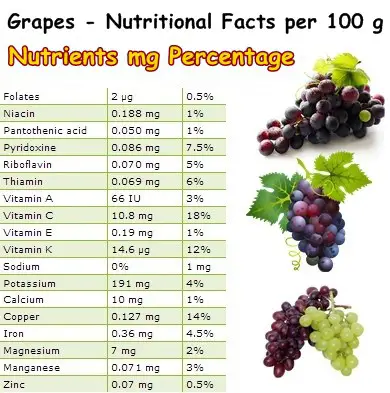You know fall is on its way when lengthy clusters of grapes start putting on beautiful, rich shades of yellow, pink and deep purple. The sweethearts of the season, grapes, make an incredibly delicious and nutritious meal. In addition to supplying us with a variety of vitamins and minerals, grapes boast innumerable health benefits. Grapes promote cardiovascular health, protect against cancer, bacterial infections and even stop the aging process due to their high antioxidant content.
Anthocyanins, resveratrol and other potent natural compounds greatly contribute to the health benefits of grapes. Grapes are the small, round or slightly oval fruit of grapevines. They grow in clusters or bunches which hang from strong climbing vines. Grape varieties vary in color immensely, ranging from from green and light yellow to pink, purple-red, deep purple and even dark blue. Very important: each color is indicative of unique organic pigments with antioxidant and anti-inflammatory properties and a range of beneficial effects on human health.

Grapes nutrition facts and benefits
Anthocyanins are pigmented antioxidants responsible for the red, blue and purple colors in many fruits, vegetables and other plants. They are natural plant pigments with powerful antioxidant effects and are found in generous amounts in fruits such as red raspberries, redcurrant, plums, blueberries, blackberries and grapes. Anthocyanins are said to scavenge free radicals and prevent cell damage and related diseases. Eating anthocyanin-rich foods such as grapes can protect against cancer and prevent premature aging.
While purple grapes have the highest concentration of anthocyanins, white grapes lack this natural pigment entirely. Interesting enough, white grapes have evolved from purple ones. Other sources of the antioxidant anthocyanin pigments include acai berries, blackcurrant, aronia, black raspberries, blood oranges, redcurrants and cherries.
Grapes are also a source of resveratrol, a polyphenol which stimulates the production of vasodilator hormones and decreases the production of angiotensin, vasoconstriction hormone. Because the concentration of resveratrol is significantly higher, a regular, yet moderate consumption of red wine is generally recommended to enjoy the benefits of the antioxidant. Resveratrol is generously found in the grape skin as well as grape seeds and protects against cardiovascular disease. While purple grapes are rich in resveratrol, the green varieties, commonly known as white grapes, contain much higher quantities of catechin, another polyphenol with potent antioxidant properties.

Resveratrol, anthocyanins, tannins and catechin can all be found in grapes in rather generous amounts. These polyphenols have powerful antioxidant effects and are believed to stop the aging process and prevent age-related diseases, with benefits for heart failure. In addition to this, resveratrol has been shown to activate 3 special genes related to longevity which has lead some scientists to theorize that moderate amounts of wine could contribute to longevity.
Because of their high antioxidant content, grapes can simply keep us looking young and beautiful. If you are opposed to drinking alcohol, which you should be, you can always choose a glass of refreshing grape juice. Not only it will satisfy your thirst, but you will also get an incredibly delicious mix of phytochemicals, vitamins and minerals.
Grapes nutrition facts per 100 g:
- Macronutrients in grapes (per 100 g):
- Energetic value: 69 kcal
- Carbohydrates: 18.2 g
- Sugars: 15.48 g
- Protein: 0.72 g
- Fats: 0.16 g
- Dietary fiber: 0.9 g
What these values mean is that grapes in general are a great food to boost energy levels, but have a high sugar content and are best eaten in moderation. Too many could raise blood sugar levels and possibly cause spikes in blood glucose levels followed by periods of very low energy. Grapes are low in fiber, but eating them with skin does provide good amounts of fiber and benefits for digestion, improved transit time and constipation relief. Also read about grapes and diabetes.
Grape seeds are a source of Omega-3, Omega-6 and Omega-9 fatty acids, the most abundant being Omega-6 and the least Omega-3 as well as antioxidants and vitamin E. The oil made from grape seeds can be used for cooking and skin care and has moisturizing, non-comedogenic and anti-aging properties that recommend it for sensitive, dry and mature skin. In addition to this, grape seed extract is widely used for skincare products ranging from lotions to cleansing products and toners.

Grapes contain small amounts of almost all the important vitamins and minerals: B vitamins, vitamin C, vitamin K, potassium, copper, iron and manganese, two of which are known for their antioxidant properties. They are a particularly good source of copper, providing 0.127 mg of the mineral, vitamin C, providing 10.8 mg and vitamin B6 with 0.086 mg. In addition to anti-inflammatory, antioxidant and anti-aging properties, grapes are good for the digestive and nervous system.
Grapevine sap
In spring, people would tie a small glass bottle to cut grapevines and let grapevine sap to slowly drip inside. Grapevine sap was used as a traditional medicine for a wide variety of skin and eye problems, notably eyesores. People would drip one or two drops of sap into the eye every morning and evening to help cure eyesores. The therapeutic potential of grapevine sap used in traditional medicinal practices is now demonstrated by scientific evidence: grapevine sap contains viniferin, a resveratrol based compound.
Viniferin has powerful anti-inflammatory, antiseptic and antioxidant properties, hence its curative properties. Grapevine sap can be kept at room temperature in a dark chamber till the following spring. In addition to this, grapevine sap was traditionally used to treat bladder infections (cystitis) and biliary dyskinesia (the returning of the bile to the gallbladder). Also, crushed grape leaves are believed to help treat sunburns and even relieve headaches.
Find out more about the benefits of grapevine sap.
Conclusion
Overall, grapes are one of the healthiest fruits available worldwide, if grown naturally, organically, meaning without pesticides. Regular consumption of fresh grapes or grape juice, even wine can support cardiovascular health, reduce cholesterol levels, prevent vasoconstriction, premature aging and even cancer. As a health tip, try eating the whole grape because the highest concentration of phytochemicals is found in the skin and seeds.
